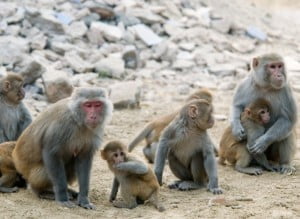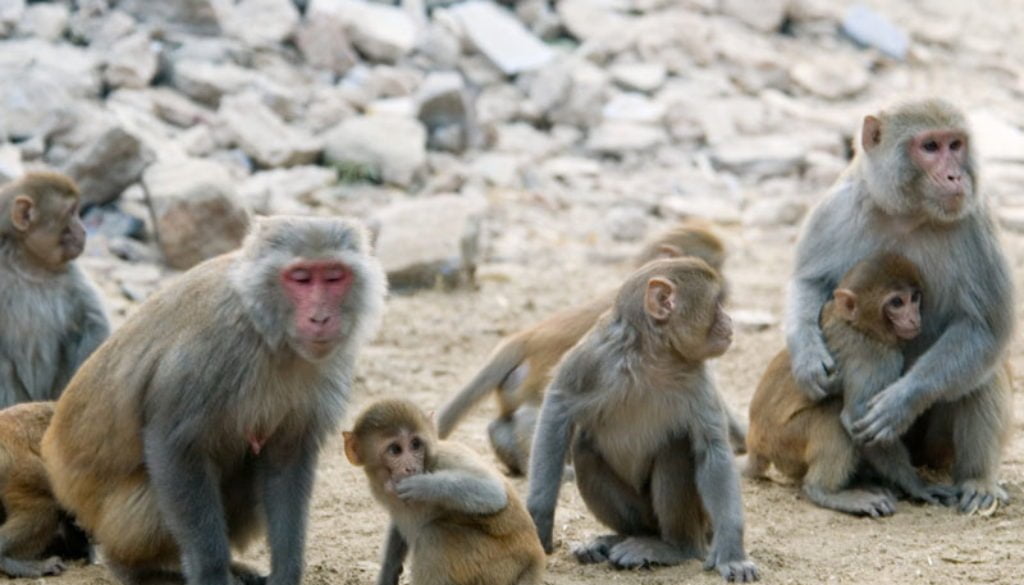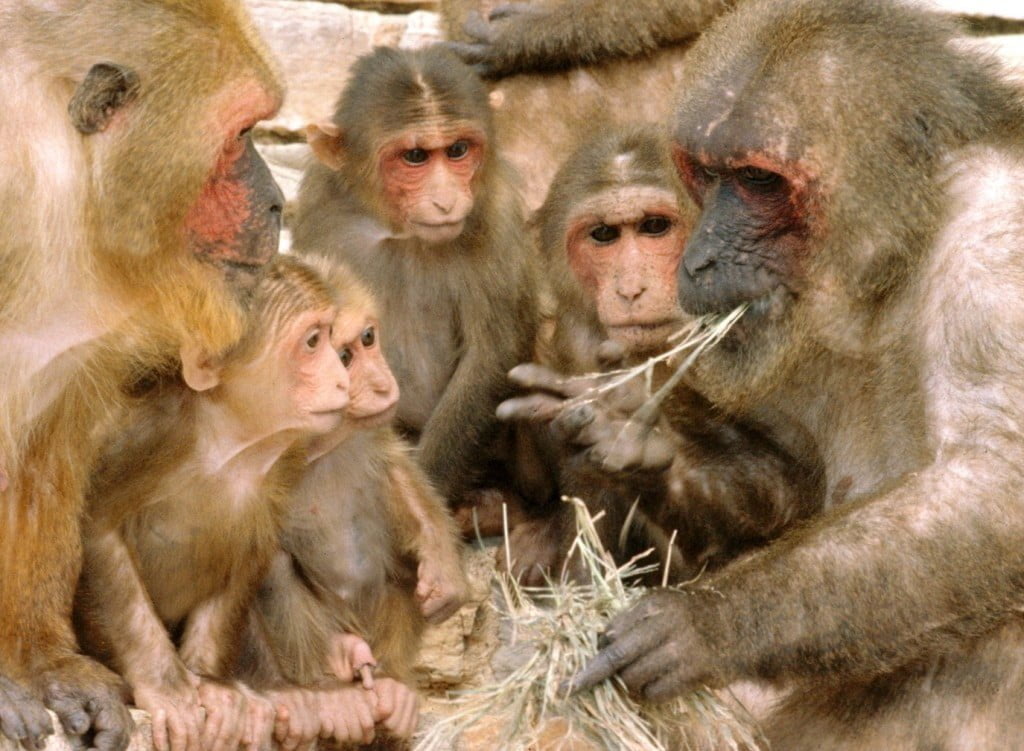The effects of manipulating social status on immune function
Kristin HarperAn interview with primatologist Jenny Tung
 This week, IAPHS member Kristin Harper interviewed primatologist Jenny Tung of Duke University about her recent article “Social status alters immune regulation and response to infection in macaques,” which appeared in Science this November. Tung’s study explores how stress resulting from the manipulation of social status affects immune function in rhesus macaques, a common species of Old World monkey. Tung found that social status influenced everything from immune cell numbers to the expression of immune genes to signaling pathways, with implications for the monkeys’ ability to fight infections. Interestingly, social subordination appears to promote antibacterial responses, whereas high social status promotes antiviral responses. Since social status is one of the strongest predictors of human disease risk and mortality, studies such as Tung’s may help us better understand the impact these factors have on the immune response in humans. Here, Tung answers questions about the work she did with collaborators Mark Wilson (Emory University/Yerkes Primate National Research Center) and Luis Barreiro (University of Montreal) to carry out this study.
This week, IAPHS member Kristin Harper interviewed primatologist Jenny Tung of Duke University about her recent article “Social status alters immune regulation and response to infection in macaques,” which appeared in Science this November. Tung’s study explores how stress resulting from the manipulation of social status affects immune function in rhesus macaques, a common species of Old World monkey. Tung found that social status influenced everything from immune cell numbers to the expression of immune genes to signaling pathways, with implications for the monkeys’ ability to fight infections. Interestingly, social subordination appears to promote antibacterial responses, whereas high social status promotes antiviral responses. Since social status is one of the strongest predictors of human disease risk and mortality, studies such as Tung’s may help us better understand the impact these factors have on the immune response in humans. Here, Tung answers questions about the work she did with collaborators Mark Wilson (Emory University/Yerkes Primate National Research Center) and Luis Barreiro (University of Montreal) to carry out this study.
How did you get interested in the biological effects of social status?
I’ve been interested in social behavior and evolution for quite some time, since before I started grad school. My introduction to social behavior came through the lens of behavioral ecology, where there is a fundamental interest in how sociality and social interactions matter from a Darwinian fitness perspective. So it wasn’t really that big of a jump, even though there is a big disciplinary gap between that tradition and folks interested in similar topics from a social inequality, social-gradients-in-health perspective. I got the opportunity to work on social status in this particular way when I started my postdoc with geneticist Yoav Gilad at the University of Chicago.
How did you get the idea to manipulate social status experimentally? It seems complicated.
Mark Wilson, my collaborator at Emory, has been manipulating social status for a while, and others like Carol Shively and Jay Kaplan at Wake Forest have also used these kinds of manipulations. It’s been known that we have the ability to do this for decades. It’s just never been combined with the particular types of analyses and genomic outcome measures that we started using.
It’s really non-trivial to put together those primate social groups. The credit there really goes to Mark and particularly to the technicians who work with him at Emory and the Yerkes National Primate Research Center. They’ve been fantastic.
What was particularly challenging was doing a second manipulation, because it’s pretty challenging to just put together the groups themselves. Going into this study, we decided that in order to dive deeply into questions of causality, we had to see the same females in different social status positions, which of course is something you can’t do in humans.
How long did it take to complete this study?
It took years to do. It’s been about five, going on six years now, since we first conceptualized the study design, and four years since we started putting together the first groups.
What were the biggest takeaways from this study, and did any of your findings surprise you?
When we did the precursor work to the study, which we published about four years ago now, we were surprised by the results. That was a much simpler study. At the time we weren’t trying to isolate particular cell types, we weren’t doing any kind of immune challenges, we weren’t doing this reciprocal rearrangement stuff, but we still found strong effects of social status on gene expression. We suspected there might be some large effects in this current study, based on our earlier findings, but even with that prior knowledge, I think we were still sort of bowled over by how clear some of the signatures in this study turned out to be.
We measured gene regulation in the immune system in the current study. There appear to be a lot of differences that are patterned by social status. Does that or does it not matter? We all walk around with an immune system that’s sort of humming along. Hopefully, most of the time it’s at a kind of baseline background level. We start to care more about it when it’s presented with a challenge, when it actually has to do something to defend our bodies.
So, we did a challenge with lipopolysaccharide, which mimics bacterial infection. We thought, okay, well we’re seeing these immunological differences at baseline. Could it just be that everybody’s system hits the roof when there’s something the cells have to physically deal with, like a potential outside invader? If so, we wouldn’t see any relationship with social status in the challenge condition. Instead we were struck by the fact that when confronted with that kind of immunological stressor, the effects of social status are even more pronounced. High-ranking and low-ranking females were even further apart than when their cells were doing the regular day-to-day business of living.
That was really striking. We were able to dig a little bit further and identify some particular pathways that we believe are associated with the differences after an immune challenge. That was pretty cool. One of the most powerful things about this type of genomic analysis is that you can look at the whole genome at once. You’re looking at ten or twelve thousand expressed genes at a time, so you get an unbiased view of what’s going on. One of the limitations of that sort of analysis is that sometimes you end up with too much information. Like, okay well now I’ve got a thousand significant hits. It’s hard to make sense of that, right? Going from this long list to something that is more biologically coherent is just a perennial issue in genomics. We think we made some progress on that in our study, which we didn’t necessarily anticipate.
For people who care about human health, like most IAPHS members, which findings can they take away and use in their work on social status and its biological effects?
Nobody questions that there are social gradients in health, but the question is why? What are the causal pathways that link social adversities, social status, and socioeconomic status to health outcomes? Our study begins to address this.
How can social status predict so many different kinds of diseases? That’s very different from thinking about how the influenza virus causes the flu, which is a very specific link between a microbe and an individual disease. And does social status directly affect health, or is it primarily linked to certain socially stratified behaviors, like smoking? Could it be that health affects social status instead? All of these issues are going on at the same time in human populations. Then you add complexities like the fact that social status can be measured in many different ways and the same person can have multiple statuses, even within the same population.
Studies like ours that work with animal models help to start simplifying things, reducing the plausible explanations. Even though humans aren’t monkeys and monkeys aren’t humans, social gradients in humans and other social mammals often end up looking fairly parallel in terms of outcomes. When we see the same biological changes for low-status rhesus macaques that we also see in humans exposed to social adversity, that starts telling us something about causality and the pathways that connect one to the other. We can’t get this information from just studying human populations.
We are able to control for a lot of confounding factors in our monkey model. There are no differences in health care, no one is smoking, nobody is on illicit drugs, they’re all eating the same diet, right? And yet, we see these basic and fairly strong differences in physiological function that have a reasonable, plausible connection with health disease and outcomes.
What comes next?
One of the most striking things we saw was that social status effects are context-dependent. They were more pronounced when cells were going through the mock bacterial infection. That suggests to us that social gradients could potentially be revealed or hidden depending on the environment. We’d really like to scale that sort of experiment up — to look at a lot of different types of cellular environments, which might reveal when social status is most important.
We’re also very interested in understanding heterogeneity in these effects. Two people can undergo what on the surface looks like exactly the same experience but have vastly different outcomes. What patterns vulnerability and what patterns resilience? We’re interested in taking advantage of our model to look at that too.
I would also love to see some more direct comparisons between the type of experiments we’re doing with captive rhesus macaques and wild primate populations or even humans. It’d be interesting to try and standardize the type of outcome measure in different populations. I don’t know of anything that’s been done like that yet, not in the same study.
For people who are interested in learning more about social structure and health in animal systems, are there any books you would recommend?
The godfather of thinking on this topic in a broad sense is Robert Sapolsky. The nice thing about Robert Sapolsky’s work is that it’s accessible across a spectrum. He’s written primary research papers, but he’s also written some really nice reviews geared towards a scientific audience. He’s a fantastic communicator of science and has also written some relevant popular science books.
The journal article: Noah Snyder-Mackler, Joaquín Sanz, Jordan N. Kohn, Jessica F. Brinkworth, Shauna Morrow, Amanda O. Shaver, Jean-Christophe Grenier, Roger Pique-Regi, Zachary P. Johnson, Mark E. Wilson, Luis B. Barreiro, and Jenny Tung. 2016. Social status alters immune regulation and response to infection in macaques. Science. 354: 1041-1045.
You may also want to check out this commentary on the article, written by Robert Sapolsky:
Robert M. Sapolsky. 2016. Proinflammatory primates. Science. 354:967-968.
 Jenny Tung, PhD, is an Assistant Professor in the Departments of Evolutionary Anthropology and Biology at Duke and Faculty Associate of the Duke University Population Research Institute. Follow her on Twitter: @jtung5.
Jenny Tung, PhD, is an Assistant Professor in the Departments of Evolutionary Anthropology and Biology at Duke and Faculty Associate of the Duke University Population Research Institute. Follow her on Twitter: @jtung5.







All comments will be reviewed and posted if substantive and of general interest to IAPHS readers.